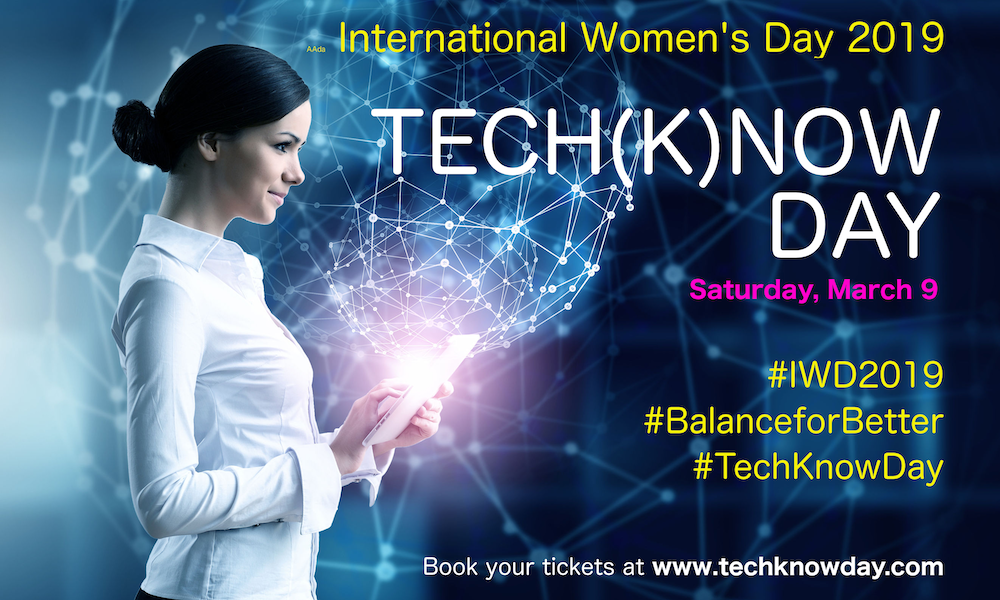Elizabeth:
It started with a tweet from a friend about an all day London tech event for those who identify as female. I had a look and the event grabbed my attention for a lot of reasons…
Variety
Rather than being all talks or all workshops, the Tech(K)now event was an interesting mix of the two. It was multiple tracks at once which meant some decisions had to be made in order to pick one session over another but being spoiled for choice is a nice complaint to have about a tech event. My only gripe is that I wish I could have attended them all.
Enrichment
We run an internal mentoring / hands on training series of workshops for our delivery teams within Scott Logic and some of the tracks covered material we had already covered or intended to cover. I am a big fan of seeing how other people teach and incorporating the good into what I do and I fully intended to take some lessons away about ways to teach new technical concepts to a group of people.
Networking
Events like this tend to make for very pleasant networking. A lot of the people there are very curious about each other, what they do and how they do it which makes for some great conversations. The atmosphere was really relaxed even in the most intensive workshops as the attendees were engaged, questioning and quick to ask for help when it was needed. I liked that there was no pressure to go out socialising afterwards as many people just wanted to return home afterwards.
Within the talks and the workshops themselves, there was a huge array of topics on offer. There was the interpersonal as well as highly technical. I love diverse events like this as they appeal to a more interesting spectrum of people. I got talking to a UX grad and a seasoned Facebook development team lead all in the space of the same hour.
Price
I love a bargain. This price for early bird tickets was a very reasonable £50. An unbelievable £50. Wait, £50 for an all-day conference with a two hour React for beginners workshop? Could this be right? Similar workshops in London were priced around £500. I was so puzzled about this that I was wondering if the event was too good to be true.
For that reason, I did some searching online. I was so glad to find myself wrong. Tech(K)now has been running twice a year since 2017 and there was some very positive and credible involvement from people I respected on the London tech scene such as Gen Ashley.
Location
The Curtain is a huge quirky space with loads of small, medium and large event rooms. The decoration was what I would imagine the fevered dreams of Eva Hesse on a bender with Terry Gillingham would look like. Madly wonderful. Even the loos were a steampunk daydream with 3D effect floor tiles and high thin-piped cast iron taps. It’s a very inspiring place to learn.

Programme:
I’ve detailed some of the best bits of the day for me and what I was able to take away from attending the event
Talks:
Cheryl Hung Twitter - Open source for first timers
Cheryl’s talk was really engaging and open. She talked about her own Open Source journey and gave some advice for people who wanted to go down a similar path. A lot of this centered on finding an ally or a sponsor who could help you navigate the tricky unwritten rules of OS programmes of work.
One thing she advised heavily against was just jumping in with code changes without consulting someone else working on the product. In those instances, the community could let it’s toxic rather than its helpful side show as a sort of kneejerk reaction. “If you wanted to start committing changes, start with documentation” she advised. No-one ever minds improvement to documentation.
The talk finished up with a shout out for the #CloudNativeLon meetup that Cheryl runs. Sometimes she is the only woman there. Time to sign up for this event if it is something you have always been meaning to do.
Dawn Budge Twitter - Audio finds its voice
Dawn has a different approach to her talk than a lot of the others who started out with an intro to themselves and their topic. She launched straight into the topic and did the intro afterwards. An approach that meant you really have to listen to stay on top of the train of points being made. There is no time for slow realisation when the talk is roaring on in front of you.
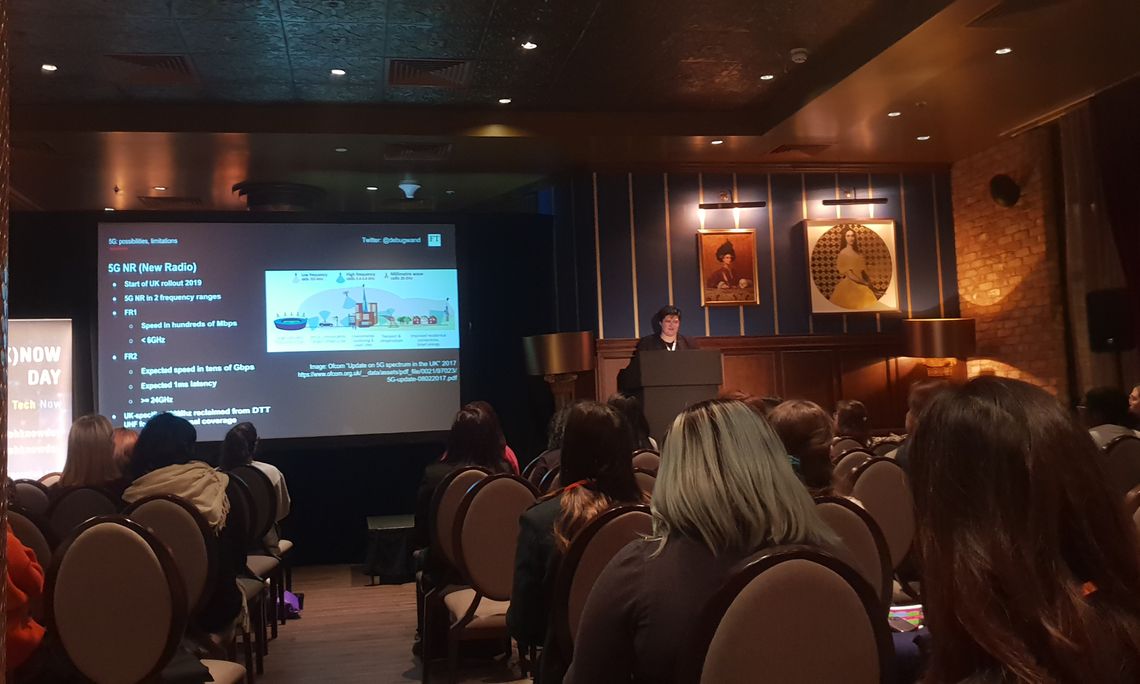
One of the most interesting parts of the talk were the considerations for the types of news content and the appropriate voices for reading them out. You cannot have the same machine voice that reads changes in the stock exchange reading out the obituary of a beloved national figure. This was interesting as it throws up the point that for all the AI / Machine learning / machine reading, we still have to make deeply personal choices in how this software is used and code the products that drive the tech accordingly. The machines are not quite ready to do without the people yet!
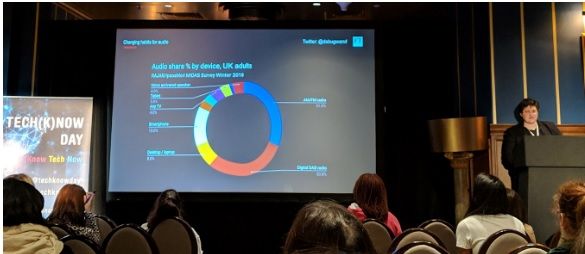
Iulia Baltoi Twitter - How to dive into 5 millions lines of code
This was a very no-nonsense common sense talk from a relatively new joiner to a huge organisation. The talk included invaluable takeaways for someone who has never been in that position on how much investigation to do and when to raise the flag and ask for help.
One of the key take-aways struck a real note for me, working as part of an enterprise programme, something I wish I could have emblazoned on t-shirts for anyone taking part in a large programme of work. Your code and the changes you make to other people’s code are not an island. They do not live in isolation.
There are bound to be an upstream / downstream / dependency / knock-on effects of any change you make in an integrated code base. Sanity check any large scale changes you propose to make with the teams around you before you make them.
Workshops:
Carlos Baraza Twitter - React beginner workshop
I was really keen to do this workshop as I’ve been concentrating on backend testing for the last 18 months. Before that, I had enjoyed the brief introduction I had to React before being whisked away into the work of APIs and Microservices. We started with the standard:
create-react-app
And went on to download the rest of the tutorial and associated code from Carlos’s github. The full instructions and outline are there if you fancy having a go at building this simple photoframe yourself.
The workshop was great fun and the pace was really engaging. I did not feel the time pass at all. We even had a civilised break for a vegan lunch in the middle. I liked the fact there were dev floorwalkers in the room to help anyone who got stuck. It is small things like that which can really make or break an attendees experience at a tech conf.
Laveena:
Leadership with Humour Workshop
I attended Vanessa Marcie’s talk/workshop about how to help organisations and people transform positively with humour. This talk was quite hilarious as she herself is a stand-up comedian and kept throwing puns every now and then. I quite enjoyed the part when she mentioned there are four styles of humour one can relate to:
Self-Defeating
* Able to make fun of oneself
* Is negative e.g. makes fun and ends on a down-note like “oh see that spelling mistake haha I’m so blonde”
Aggressive Humour
* Involved put-downs or rudeness towards a certain individual
* Some might find this funny whilst others might laugh but feel a discomfort too
Self-Enhancing Humour
* Able to make fun of oneself
* Is positive, e.g. shows how one grew from the experience
Affiliative Humour
* Telling funny jokes that everyone finds funny
* Aim is to create happiness and well-being
She suggested it is always a good thing to be a part of the affiliative and self-enhancing humour. This is the Humour quiz all of us participated in to understand where our humour lies. Try it and see what type of humour you have. Let us spread more happiness and humour around us.
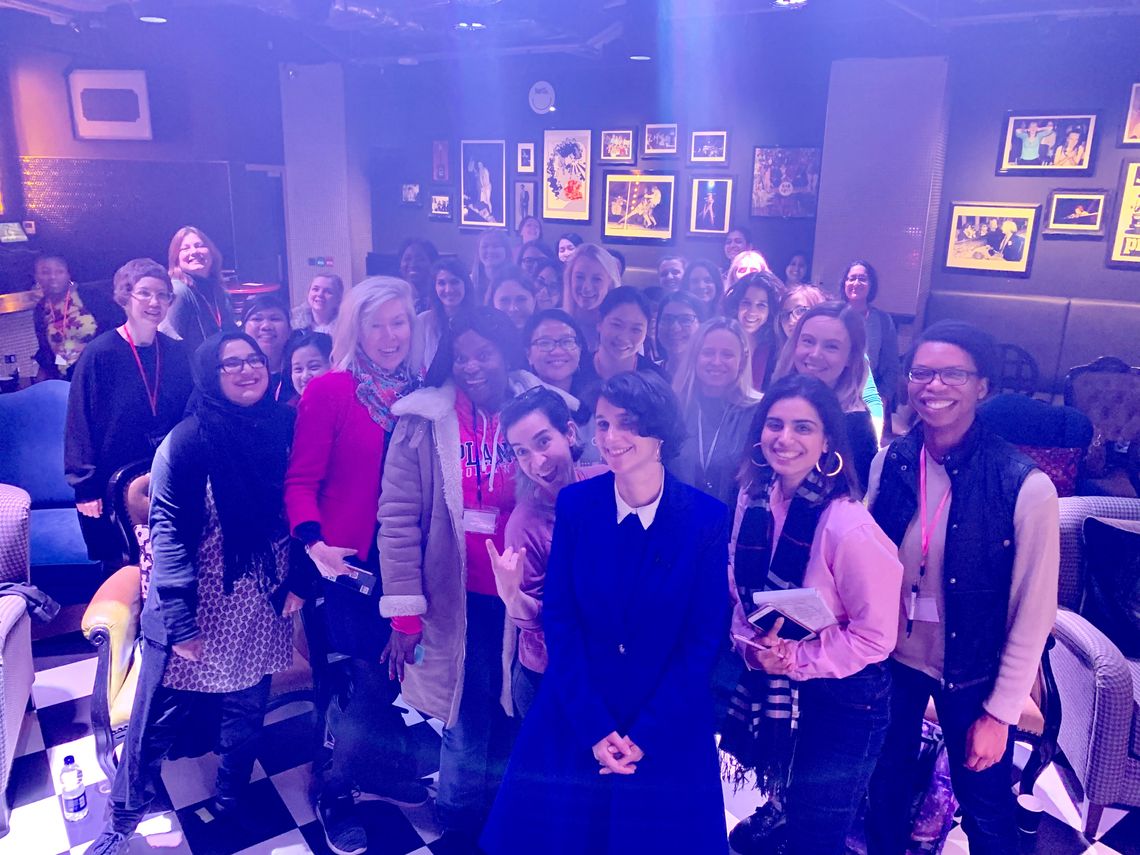
Hannah:
I travelled from Newcastle to London to attend this day, which was a bit of a slog, but totally worth it. I didn’t get to attend the last few hours of talks and workshops since I was so tired from travelling but I managed to attend a good few during the day!
The first talk I attended was by Cheryl Hung, all about open-source software. I have never really dabbled in open-source, aside from opening up a few git repos for personal projects. It is a very daunting area - how do you even get started contributing to open-source projects? Cheryl recommended to find a sponsor: open source has a lot of unspoken rules and etiquette, different for each project. A sponsor can be anyone from a colleague or employer to someone you meet at meetups or events. Someone who is happy to help you navigate the murky waters and rules of the open-source project you are interested in.
The second talk attended was called “Audio Finds Its Voice” by Dawn Budge. This was a great talk going over just how much voice and audio is taking over the tech scene. Natural Language Processing is improving massively, especially since audio needs to be automatically transcripted so people can find it via search engines. There is also a big uptake in Podcasts, and so many houses have voice controlled software and “smart devices”. The advice was to assess what skills you need to keep up with (or ahead of) the curve - not just for developers but for UI design (how do you design audio software to make it intuitive to use?) and testers too.
I attended one last talk before I went to chat to people and attend workshops, and this was “How to Dive in to 5 Million Lines Of Code… And Keep Your Sanity” by Iulia Baltoi. I found this to be a very enjoyable talk - she documented her growth as a developer from working on small start-up projects to moving on to the mammoth monstrosity of a codebase that is Twitter. Her 5 nuggets of advice are as follows:
- Give it time and patience. Spend some time every day experimenting and exploring the code.
- Prepare for A LOT of information intake. Read through documentation - it can provide some historical context, and reasons as to why key decisions were made. Take notes - you can’t remember everything!
- Become a detective! Learn how to find things, and use the product to learn functionality.
- Be mindful when writing code. A small change can have great impact - think about how it affects other people working in the same codebase.
- Don’t be afraid to ask questions. She is a big advocate of the “30 minute golden rule”. If you can’t understand something after 30 minutes of trying - ask for help.
The workshop that I attended with Laveena had a disclaimer as soon as we walked through the door: “this is not for beginners”. I do wish I had known this before attending since there was no time to run to other workshops by the time we had gotten to this building, and I have never done any object oriented design coming from an art background.
.jpg)
However, thankfully, Laveena was there to help me understand. We went through the basics of relationships with class names and collaborators, and I think that this structure could easily be applied to creating relationship diagrams with relevant stakeholders to describe complicated feature functionality. I’m looking forward to experimenting with this on upcoming features in my project.
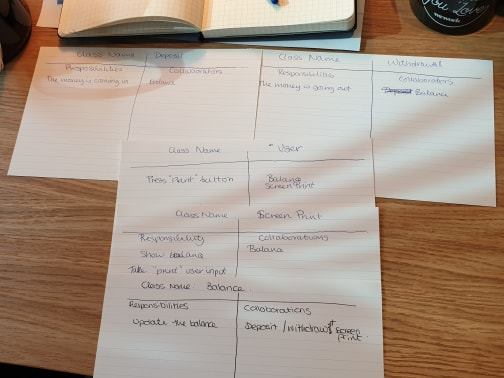
All in all it was a fantastic if not incredibly tiring day, and I am so glad that I attended. It was great to see so many women doing so much cool stuff in tech, sharing knowledge and building each other up.
Sioned:
After a busy week at work and at home, probably my preferred option for a Saturday morning would be to have a lie in and a relaxing day. However the Tech(K)now day seemed a good opportunity to take some time celebrate International Women’s Day and learn something new. I headed over to wonderful hotel north of Liverpool Street, and was greeted by some friendly organisers, coffee and croissants and some interesting opening talks. See Louise Towler’s article for more detail.
After coffee break it was time to hit the workshops. There were 5 tracks to choose from and I chose to follow one on React, Kubernetes and Actions on Google. The first two I’m familiar with from my current project, however I haven’t had any formal training in either of these, I’ve just been picking up bits and pieces of knowledge as I go along, so I thought it would be good to go back to basics and get a solid understanding of these frameworks.
In React we got to create an application to view photos. We used codesandbox to a give a rapid way of getting something working almost immediately. I thought Carlos Baraza was excellent at introducing the subject of React components and how there are different conventions and styles of developing, and his github tutorial is clear and easy to follow. Everyone worked independently on their own laptops, but all other attendees were very friendly and helpful if you got stuck, and there were a couple of helpful assistants on hand if you needed even more advice.
After salad lunch, I stayed in the room for the Kubernetes workshop. The prerequisites stated that you needed mini-kube installed and this in turn requires a hypervisor installed. I was unable to install hypervisor on my work laptop due to lack of admin rights, therefore I wasn’t hopeful that I’d be able to participate in this workshop. However Jen Strejevitch, our tutor was great and explained that although mini-kube would be the preferred option, there was an online tool which uses katacoda. Again Jen’s tutorial was very easy to follow and really I enjoyed her presentation as she described the basic architecture of Kubernetes and her experience in learning and becoming certified. Katacoda looks a great way to quickly familiarise and try out and showcase new features directly in the browser without any downloads or configuration.
To finish the day I went to a ‘no previous experience required’ workshop run by on Actions on Google. This is a fun, exciting developer platform that lets you extend the functionality of the Google Assistant to any kind of smart device. Following the Google tutorials, we used Dialogflow and Firebase to create and test an app that was able to respond to simple questioning about favourite colours. The tutorials themselves are already quite comprehensive and you can probably work through them at home on your own, however it was great to do this collectively with others and have experts on hand to advise and get ideas about how easy it could be to extend this to something more sophisticated. Thank you Augul, Kaan and Hawra for all your enthusiasm, patience and expertise in explaining everything.
I had a great day, not only were there plenty of interesting people to talk to and everyone was really approachable and friendly, but there were some very inspirational talks at this event. I left feeling optimistic about all the future opportunities in the tech industry and how the potential to learn different small ideas can lead to better understanding of bigger things.
